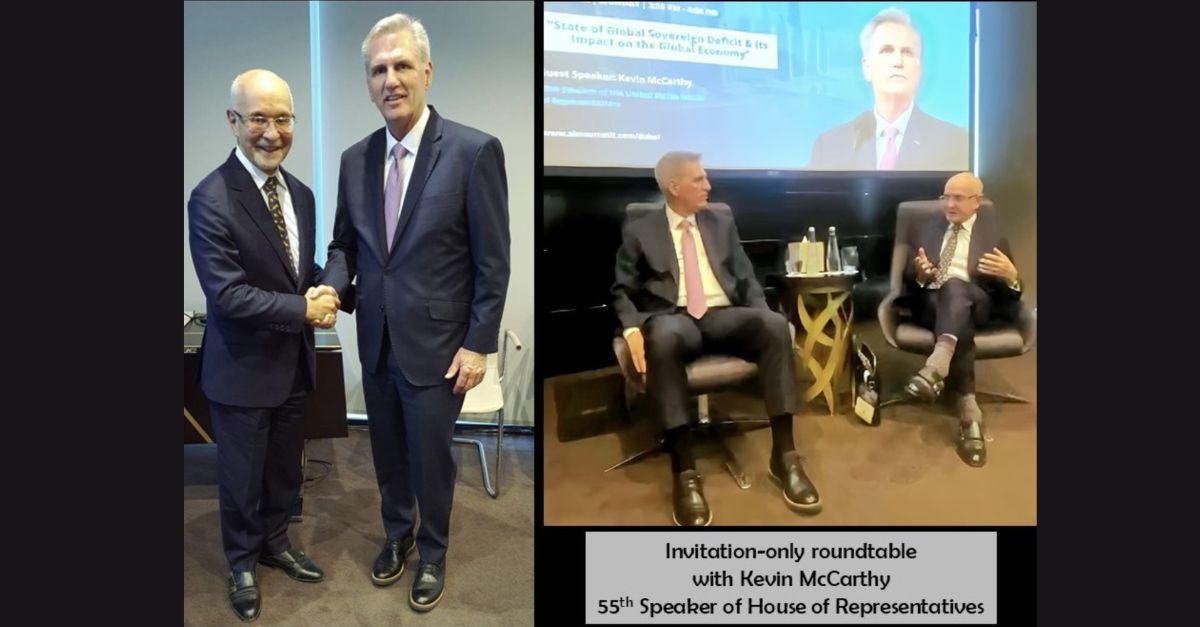Notifications

6 minutes, 29 seconds
-337 Views 0 Comments 0 Likes 0 Reviews

At AIM Summit Dubai, Kevin McCarthy, the 55th Speaker of the US House of Representatives, led an exclusive discussion on the growing sovereign debt crisis, financial volatility, and risks facing global markets. The conversation, moderated by David Gibson-Moore, provided a deep dive into economic instability, geopolitical challenges, and the future of financial markets.
The discussion focused on two major concerns:
The increasing burden of sovereign debt on global economies
The rise of political instability in Western democracies and its economic implications
As global markets grapple with rising inflation, interest rate hikes, and policy uncertainties, McCarthy emphasized the need for strong leadership, economic resilience, and strategic reforms to stabilize economies.
McCarthy underscored the alarming trend of excessive government borrowing, particularly in the US and other major economies. Governments have been relying on debt to fund social programs, infrastructure projects, and economic recovery efforts, but the long-term sustainability of this approach remains uncertain.
Key concerns related to sovereign debt:
Increased debt servicing costs due to rising interest rates
Weaker economic growth as governments struggle with financial constraints
High risk of inflation caused by excessive money printing
Global market volatility as investors react to debt-driven uncertainties
The Federal Reserve and other central banks have taken an aggressive stance on interest rate hikes to curb inflation. However, these policies have led to:
Higher borrowing costs for businesses and governments
Slower economic expansion and investment reductions
Rising risk of a global recession if economic policies fail to stabilize markets
McCarthy warned that without proper debt restructuring and fiscal discipline, major economies could face prolonged financial instability, similar to what is often seen in emerging markets.
Another major theme at AIM Summit Dubai was the impact of political polarization on economic decision-making. McCarthy pointed out that deep divisions in US politics have made it increasingly difficult to implement critical economic reforms.
Government shutdown risks due to budget conflicts
Policy stagnation affecting investment and economic growth
Weakened global confidence in Western economies
Disruptions in international trade agreements due to shifting political priorities
The growing lack of bipartisan cooperation has created uncertainty for businesses and investors, making it harder for economies to recover from financial crises.
McCarthy introduced the concept of "EM-ification," referring to how developed economies, particularly the US, are beginning to resemble emerging markets due to:
Increasing political instability
Weaker government institutions
Rising economic inequality
Higher market volatility
If these issues persist, the US could face long-term economic decline, capital flight, and reduced investor confidence.
While emerging markets remain attractive for investors due to their high growth potential, they also come with significant risks. McCarthy and Gibson-Moore highlighted some of the biggest concerns affecting these economies:
✅ Currency volatility and inflationary pressures
✅ Debt dependency on foreign capital
✅ Geopolitical risks impacting trade agreements
✅ Weak institutional frameworks leading to regulatory uncertainties
For investors, understanding these risks and adopting flexible strategies is essential for navigating the complexities of emerging markets.
McCarthy advised investors to focus on:
Sustainable and resilient sectors such as technology, agriculture, and renewable energy
Diversification strategies to mitigate financial shocks
Geopolitical trends shaping global trade and economic alliances
As the global economy continues to evolve, business leaders, policymakers, and investors must focus on long-term economic stability and risk management. Some of the crucial strategies discussed included:
Reducing sovereign debt dependency through responsible fiscal policies
Encouraging private sector growth to drive economic recovery
Strengthening cross-border trade agreements to stabilize global supply chains
Addressing political polarization to ensure economic reforms can be effectively implemented
Investing in innovation and sustainable industries to promote long-term growth
McCarthy emphasized that while the global economy faces significant challenges, it also presents opportunities for transformation and growth. With the right economic strategies, countries can mitigate financial risks, attract foreign investments, and build resilient financial systems.
The AIM Summit Dubai provided a platform for critical discussions on the future of global finance, sovereign debt, and economic volatility. Kevin McCarthy’s insights highlighted the importance of proactive policymaking, economic resilience, and strategic investments in navigating an uncertain financial landscape.
As economies face rising political and economic risks, staying informed and adopting flexible financial strategies will be key to long-term stability and success.

